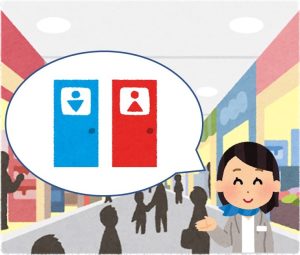– Vol.14 –
ARC teacher Mimi Sensei will answer your questions regarding Japanese language.

A:
If you noticed the superfluous “お” in the word「おトイレ」, it means that you are doing everything well with your keigo study. Obviously, it’s great that you want to use the most correct version of Japanese.
When adding the honorific prefixes “お” and “ご” to the nouns, there is in fact the rule that says that you don’t add the 2 prefixes before katakana words, loans from foreign languages. Clearly the word “toilet”,「トイレ」, is katakana, so the general rule still applies to this case. But in reality, Japanese people (me included) use that expression. For example the first time you go to a restaurant, we might ask「おトイレは、どちらですか」(otoire ha, dochiradesuka).
Does this mean you cannot use the expression 「おトイレ」? Let me share my opinion. I believe that the wordトイレ is, more than a loanword, it was completely assimilated by Japanese language. That’s why I feel that it’s not「×」(wrong), but rather「△」(partially correct, debatable).
Maybe, and it’ only my hypothesis, maybe those people use the word「おトイレ」that way because, correct or incorrect, it helps them feeling less embarrassed…


